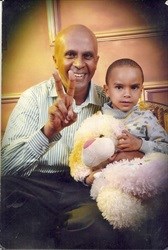The 2014 Golden Pen of Freedom, the annual press freedom prize of the World Association of Newspapers and News Publishers (WAN-IFRA) has been awarded to Ethiopian journalist Eskinder Nega, who is serving an 18-year jail sentence.
The award was presented Monday in Turin, Italy, during the opening ceremonies of the 66th World Newspaper Congress, 21st World Editors Forum and 24th World Advertising Forum, before 1,000 publishers, chief editors, CEOs, managing directors and their guests.
A free-thinker and relentless advocate for freedom of expression, Nega has become an emblem of Ethiopia's struggle for democracy. Over the past decade his commitment to human rights has placed him in jail on at least seven occasions.
He is being held in Kaliti Prison outside of Addis Ababa, serving as a convicted "terrorist" for having challenged the very same laws used to imprison him, and for questioning whether the Arab Spring protests could be repeated in Ethiopia.
Peaceful change and reconciliation
In presenting the award, World Editors Forum President Erik Bjerager said: "The Ethiopian government has tried to present Eskinder Nega as a rabble-rouser bent on fomenting violent revolution. However, accounts from other journalists, backed by court documents and the hundreds of articles he has written, portray a tenacious writer who has called only for peaceful change and reconciliation."
"Without abatement, Ethiopia resorts to anti-terrorism legislation to silence opposition and shackle the press. Alarmingly, beyond Ethiopia, countless states around the world are misapplying legislation designed to protect our societies to journalists, bloggers and freedom of expression advocates. Let me be clear: Journalism is not terrorism," said Bjerager.
Nega's newspapers Asqual, Satenaw and Menelik were among thirteen titles closed in a violent clampdown following 2005 elections in which the ruling EPRDF party claimed a disputed victory. Opposition leaders, activists and journalists were jailed, and Nega and his wife Serkalem Fasil (also a renowned newspaper publisher), were among those charged with treason. The pair spent seventeen months in jail.
Speaking out
After their release, and despite losing his license to practice journalism, Nega continued to write. At the onset of the Arab uprisings at the beginning of 2011, he was threatened with further jail time and even the death penalty. The journalist stood by his writing and speculated that what was happening in Egypt, Tunisia, and elsewhere in the Arab world could occur in Ethiopia if the regime refused to enact reforms.
Five days before his latest arrest, Nega published a column calling for the government to stop the imprisonment of dissenters and highlighted the brutal conditions they faced in prison.
He spoke out in their defense, saying none of them fitted the profile of a "terrorist." But his words encountered the very same laws that put his colleagues behind bars, and Nega returned to Kaliti prison on 14 September 2011.
Accepting the award at the request of Nega's family, who were unable to travel from their home in the United States, Swedish journalist Martin Schibbye; himself a former prisoner of the Ethiopian regime, jailed alongside Nega for 11 months between 2011 and 2012; said: "We must remember that Nega at many points faced a choice. He is intelligent, well educated, he could have chosen an easy life, he could have chosen another profession, but the love for the truth, for his country, for his fellow human beings, and for Ethiopia, made him into journalist. He stayed. And he continued to write. That decision brought him to the dark cells. Not one time. But nine. Nine.
"His stubbornness is demonstrating a brand of moral courage that we need now more than ever. And courage is the only thing he is guilty of."
More on the Golden Pen of Freedom can be found at www.wan-ifra.org.























